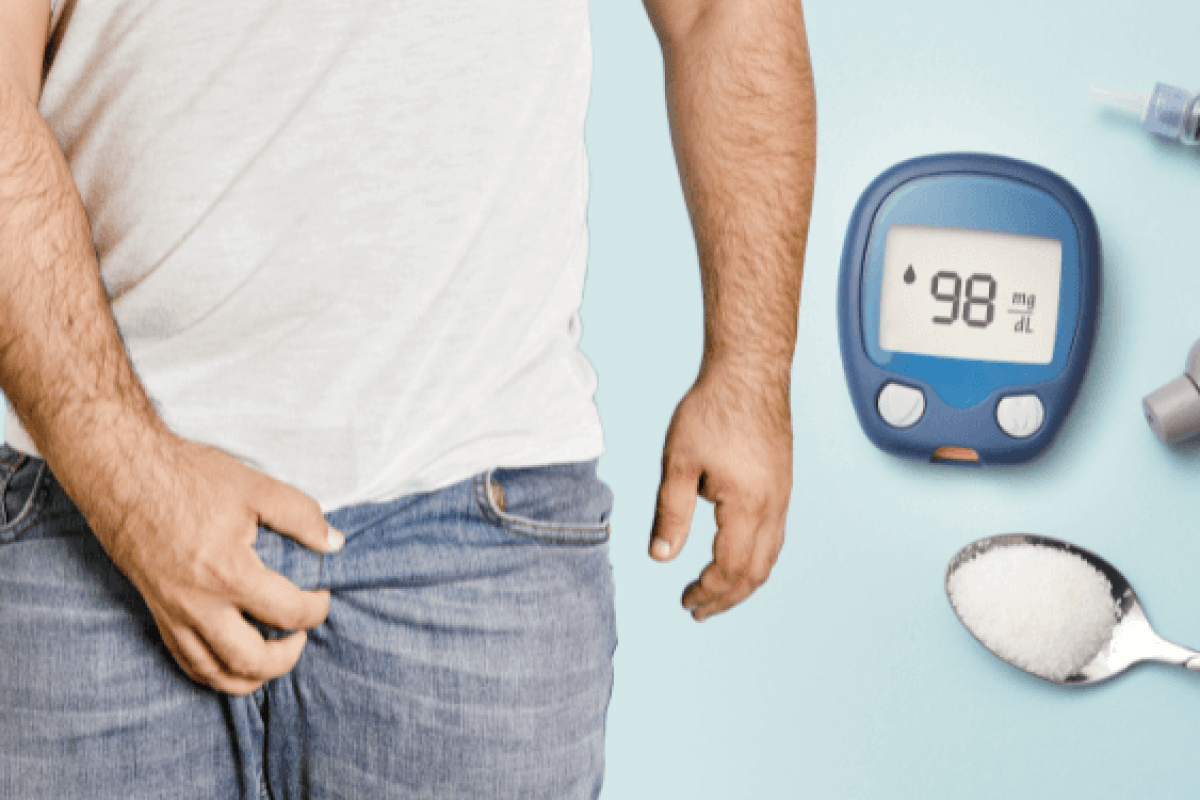Diabetes and Erectile Dysfunction: What You Need to Know

Last Updated on May 12, 2024 by Lauretta Iyamu, PharmD
Hey there! If you have diabetes and also struggle with erectile dysfunction, you’re definitely not alone. Millions of men have experienced the same thing. But what is the connection between diabetes and erectile dysfunction?
This blog post will discuss what you need to know about this topic. We’ll explore the possible risks associated with this condition and how to manage it properly. So, read on and find out more about diabetes and erectile dysfunction.
What is Erectile Dysfunction?

Erectile dysfunction is a condition that commonly affects men over the age of 40. It is defined as a persistent inability to achieve an erection sufficient for sexual intercourse.
Reduced sexual desire, erectile difficulty during sexual activity, or lack of spontaneous erections at any time can also characterize erectile dysfunction. There are many potential causes of erectile dysfunction, but the most common are lifestyle choices such as smoking and obesity.
If left untreated, erectile dysfunction can lead to depression and relationship problems. In some cases, surgery may be necessary to correct the problem.
How Does Diabetes Affect Erectile Dysfunction?
There is a close connection between diabetes and erectile dysfunction (ED). Diabetes can damage blood vessels, which can impair the flow of blood to the penis. This damage can lead to problems with sexual arousal and performance. Additionally, increased blood sugar levels can contribute to ED by triggering inflammation and promoting cell death in the penis. All of these factors can increase the risk of ED in men with diabetes.
However, no evidence treating diabetes will improve ED symptoms on its own. While treating other underlying causes of ED may help prevent or reduce the damage done to the penis by diabetes, it is essential to remember that anything that affects erections (such as low testosterone) may also be affected by diabetes. Thus, managing both conditions concurrently may be most effective in treatment outcomes for both conditions.
Risk Factors for Developing Erectile Dysfunction
Have you ever stopped to think about the risk factors for erectile dysfunction (ED)? It’s not just a problem that affects older men; guys of all ages can be at risk. There are a few risk factors that can lead to developing erectile dysfunction, including diabetes. Diabetes can damage blood vessels, which can affect the flow of blood and oxygen to the penis. This effect can cause sexual problems, including difficulty achieving an erection.
Here are some things that may increase your risk of developing ED:
- Age (risk increases as you get older)
- Chronic health conditions (such as heart disease, diabetes, and high blood pressure)
- Obesity
- Smoking
- Substance abuse
- Certain medications
- Psychological factors (such as stress, anxiety, and depression)
Additionally, diabetes can also increase the risk of other conditions that can lead to erectile dysfunction, such as high cholesterol levels or heart disease. Therefore, if you have diabetes and experience erectile dysfunction, it’s important to see your doctor for help identifying and treating any underlying causes.
Symptoms of Erectile Dysfunction

If you have diabetes, your blood sugar levels can affect your ability to have an erection. High blood sugar levels can cause the blood vessels in your penis to become damaged. This can lead to erectile dysfunction.
Here are some common symptoms of ED:
- Trouble getting an erection
- Difficulty maintaining an erection
- Reduced sexual desire
- Performance anxiety
If you have trouble getting an erection, talk to your doctor about seeing a specialist.
Diagnosing and Treating Erectile Dysfunction
Erectile dysfunction is a common problem that can cause significant distress for men. It is estimated that around 30% of men over 40 experience some form of erectile dysfunction. The causes of erectile dysfunction are numerous and can include the following:
- Poor blood flow to the penis
- Low testosterone levels
- Age, diabetes
- Drugs such as Alprazolam (Xanax) and other antidepressants
- Neurologic conditions such as spinal cord disease or brain tumors
- Other health problems
If you think you may have erectile dysfunction, it is vital to seek help from a qualified doctor. A simple blood test can help to rule out other possible causes of your ED. However, if your symptoms persist even after undergoing testing and treatment for other possible causes, you may be diagnosed with ED associated with diabetes.
There are many different treatments available for ED related to diabetes, including:
- Medications such as Viagra (Sildenafil) or Cialis (Tadalafil)
- Surgery, such as penile implants
- Injections of Botulinum Toxin Type A (BTX-A)
- Vacuum therapy devices such as the Penomet
- Pump devices called semipermeable filters
- Intensive physical rehabilitation
Treatment options vary depending on the severity of your diabetes mellitus and specific symptoms.
Tips for Managing Diabetes and Erectile Dysfunction
Managing diabetes and erectile dysfunction can be tricky, but there are a few tips to keep in mind. First, always speak with your doctor about any potential treatments for ED and diabetes. Many medications can help improve blood sugar control and erectile function.
However, discussing your treatment options with a healthcare provider before starting any new therapy is important. Additionally, ensuring adequate hydration and sex education can be critical for men with diabetes and their partners.
Finally, erectile dysfunction and diabetes can affect your health, so you should get regular checkups and maintain good health if possible.
Prevention Strategies for Diabetics to Reduce Risk of Erectile Dysfunction
As diabetes worsens, many people experience erectile dysfunction (ED). According to the American Diabetes Association, the most common complication of type 2 diabetes is ED. While it’s true that not all people with diabetes develop ED, it’s important to know what can cause this problem and how to manage it.
One fundamental cause of ED is high blood sugar levels. In addition, hyperglycemia causes the nerves in your penis to become inflamed or affected. This can interfere with blood flow and cause ED.
To help reduce your risk of developing ED, ensure you control sugar levels by following a healthy diet and exercising regularly. And if you’re experiencing problems with sexual function, talk to your doctor about testing for prediabetes or diabetes.
Some prevention strategies for people with diabetes to reduce the risk of ED include:
- Regularly monitoring blood sugar levels
- Maintaining a healthy weight
- Eating a balanced diet
- Exercising regularly
- Keeping a healthy stress level
Natural Remedies for Treating Erectile Dysfunction

Some natural remedies can help treat erectile dysfunction. Many people find success using:
- Supplements
- Herbs and vitamins
Here are some tips on how to choose the correct remedy for you:
Supplementation
Many people find success by supplementing with testosterone, which is known to improve blood flow and function in the penis.
The dosage should be based on your medical history and current health status. Be sure to speak with your doctor before taking any supplements, as they may have other side effects.
Herbs and Vitamins
Studies show that some herbs and vitamins improve sexual function in men. These include:
- Yohimbe (Bark)
- Ginkgo biloba (Ginkgo Biloba)
- Horny Goat Weed (Epimedium)
- L-arginine (L-Arginine Alpha-Ketoglutarate)
- Tongkat Ali (Tongkatei Alijen)
- Maca Root (Yeque)
- Dandelion root tea (Taraxacum officinale )
- Green tea catechins
- Anthocyanins from red grapes or cranberries
- Selenium sulfide MSM complex USP/Selenium Oxygen Complex 50/500 mcg. cordyceps sinensisWu Zhu Comfrey Tea Extract 200 mg.
- Brahmi 100mg., Schizandra 60mg.
While these therapies work well for many men, others find that specific supplements do not work for them or produce unwanted side effects. Therefore, it is important to consult a qualified healthcare practitioner before starting any treatment plan for erectile dysfunction.
How to Talk to Your Doctor About Erectile Dysfunction

If you are experiencing erectile dysfunction, there are a few things you can do to address the problem.
First, be sure to talk to your doctor about the issue. They can prescribe treatments or refer you to specialists who can help.
These medications will help preserve your blood vessels and improve blood flow throughout your body, which may help with erectile dysfunction. Finally, remember that exercise and a healthy diet also play an important role in overall health and can improve sexual function.
Common Medications Used to Treat ED and Diabetes
Diabetes and erectile dysfunction are two diseases that can affect each other adversely. For example, conditions such as high blood sugar and low testosterone levels can lead to ED. Medications that control diabetes (such as insulin) can also increase the risk of developing impotence.
There are a variety of treatments available for both conditions, but it is important to discuss any potential treatments with your doctor. Your doctor may recommend the following:
- Lifestyle changes
- Medication adjustments
- Combination of both
In some cases, surgery may be necessary to correct underlying problems in the body that are causing ED.
Diet and Exercise Tips for Improving ED and Diabetes

There is no one-size-fits-all answer to improving ED and diabetes; the best approach will vary depending on the individual’s circumstances. However, there are a few general guidelines that can help:
- Address both issues head-on by seeking professional advice and treatment for ED. Diabetes medications alone cannot cure the condition, but they can help improve blood sugar control and overall health and well-being.
- Strive to maintain healthy eating habits by including plenty of fruits, vegetables, whole grains, low-fat proteins, and minimally processed foods in your diet. In addition, avoid high sugar intake, sweets, and junk food.
- Exercise regularly for at least 30 minutes per day—even if it’s just walking around your neighborhood or taking short bursts of aerobic activity like jumping jacks or squats. Exercise can help improve insulin sensitivity and reduce the risk of diabetes complications such as heart disease, stroke, or kidney failure; it also boosts libido in men who struggle with erectile dysfunction (ED).
Mental Health Considerations for People with ED and Diabetes
There are a few mental health considerations if you’re a person with diabetes and erectile dysfunction. First, many men with ED experience significant psychological distress. This could include:
- Feelings of inadequacy
- Depression
- Anxiety
- Stress
It is essential to seek help if these symptoms bother you more than would be expected for your situation. Additionally, it is common for a person with diabetes to experience other medical problems concurrently, such as hypertension or coronary artery disease, which may also contribute to poor sexual function.
If you experience difficulties getting an erection due to any of the following issues, discuss them with your doctor: low blood sugar (hypoglycemia), high blood sugar (hyperglycemia), heart disease, stroke, kidney disease, nerve damage from diabetes, medication side effects, or low testosterone levels.
There are a few symptoms of erectile dysfunction in diabetic patients. The most common is difficulty getting an erection due to low blood sugar (hypoglycemia). Other symptoms include difficulty achieving orgasm, decreased sexual desire, and problems with sexual performance. If you experience any of these symptoms, it is important to speak with your doctor.
Treating ED as a Complication of Diabetes
Mental health issues are common in people with diabetes, as well as those who have ED. Depression and anxiety are common in both groups and can lead to decreased sexual function and increased rates of suicide. Treatment for ED and diabetes should include mental and physical health treatments.
Physical treatments for ED include exercise, weight loss, and medication. Exercise can improve blood flow to the penis, while weight loss can reduce the amount of fat around the penis. Medications such as phosphodiesterase type 5 inhibitors (such as sildenafil) can improve blood flow and erection quality.
Mental health treatments for ED include counseling, therapy, and medication. Counseling can help you understand your feelings and improve your communication skills. Therapy can also help you identify and address the reasons for your depression and anxiety, which can improve your mood and ED function. Medications such as SSRIs (selective serotonin reuptake inhibitors) are also effective in treating mental health conditions in diabetes patients.
Maintaining Good Sexual Health for Individuals with Diabetes
People with diabetes and erectile dysfunction (ED) face additional challenges regarding maintaining good sexual health. The two conditions can lead to decreased blood flow and an inability to achieve an erection. This can impact both the emotional and physical aspects of sexual activity.
Maintaining good sexual health requires a combination of a good diet, exercise, and stress management. It is also important to keep your diabetes under control. If you have diabetes, your doctor may recommend medications or other treatments to help improve your blood sugar levels.
However, there is no one-size-fits-all approach to improving sexual health. You will need to work with your doctor to find the best solution.
Resources for People with ED and Diabetes
There are a few things that you can do to maintain good sexual health for individuals with diabetes.
First, be sure to keep your blood sugar under control. This will help to prevent any spikes in blood sugar that could lead to problems with your blood vessels and, ultimately, your ability to have an erection.
Additionally, make sure to get enough exercise. This can help improve your overall circulation and, as a result, your sexual health.
Finally, talk to your doctor about any concerns you may have about sexual function. They may be able to recommend some additional treatments or therapies that could help you improve your sexual life.
Wrapping Up
In conclusion, erectile dysfunction and diabetes are serious medical conditions that can significantly impact your life. It is important to understand the relationship between the two and how they can affect each other.
Taking steps to manage your diabetes and erectile dysfunction, such as following a healthy diet and exercising regularly, can help reduce your risk of developing ED or further complications from diabetes.
If you are experiencing symptoms of ED, it is important to talk to your doctor about possible treatments. If you’re a person with diabetes and ED, many resources are available to help you manage the conditions and live a healthy life.
References
- Leisegang K, Finelli R. Alternative medicine and herbal remedies in the treatment of erectile dysfunction: A systematic review. Arab J Urol [Internet]. [cited 2023 Jan 9];19(3):323–39. Available from: https://www.ncbi.nlm.nih.gov/pmc/articles/PMC8451697/
- Evert AB, Franz MJ, American Diabetes Association, editors. American Diabetes Association guide to nutrition therapy for diabetes. Third edition. Arlington: American Diabetes Association; 2017. 628 p.
- Rew KT, Heidelbaugh JJ. Erectile dysfunction. Am Fam Physician. 2016 Nov 15;94(10):820–7.
- Shiferaw WS, Akalu TY, Petrucka PM, Areri HA, Aynalem YA. Risk factors of erectile dysfunction among diabetes patients in Africa: A systematic review and meta-analysis. J Clin Transl Endocrinol. 2020 Sep;21:100232.
- Parmar RS, Verma S, Neelkamal null, Pathak VK, Bhadoria AS. Prevalence of erectile dysfunction in Type 2 diabetes mellitus (T2dm) and its predictors among diabetic men. J Family Med Prim Care. 2022 Jul;11(7):3875–9.
- Nobili S, Lucarini E, Murzilli S, Vanelli A, Di Cesare Mannelli L, Ghelardini C. Efficacy evaluation of plant products in the treatment of erectile dysfunction related to diabetes. Nutrients. 2021 Dec 17;13(12):4520.
- Dean RC, Lue TF. Physiology of penile erection and pathophysiology of erectile dysfunction. Urol Clin North Am. 2005 Nov;32(4):379–95, v.CloseDeleteEdit
- Jin M, Yuan S, Wang B, Yi L, Wang C. Association between prediabetes and erectile dysfunction: a meta-analysis. Front Endocrinol (Lausanne). 2021;12:733434.
- Skeldon SC, Detsky AS, Goldenberg SL, Law MR. Erectile dysfunction and undiagnosed diabetes, hypertension, and hypercholesterolemia. Ann Fam Med. 2015;13(4):331–5.CloseDeleteEdit
- Maiorino MI, Bellastella G, Esposito K. Diabetes and sexual dysfunction: current perspectives. Diabetes Metab Syndr Obes. 2014;7:95–105.CloseDeleteEdit



